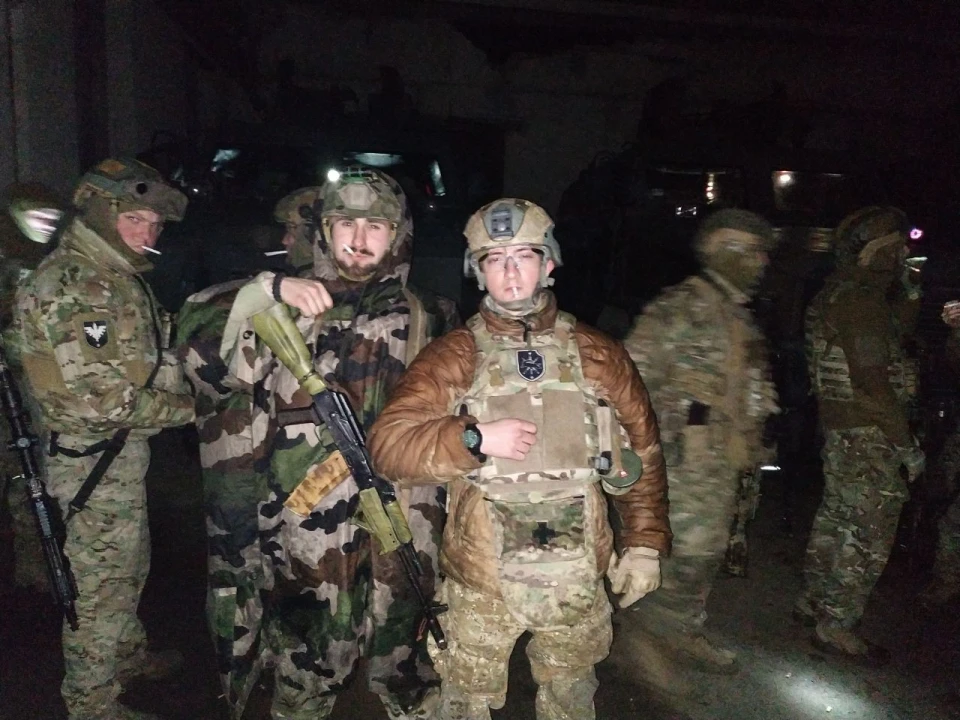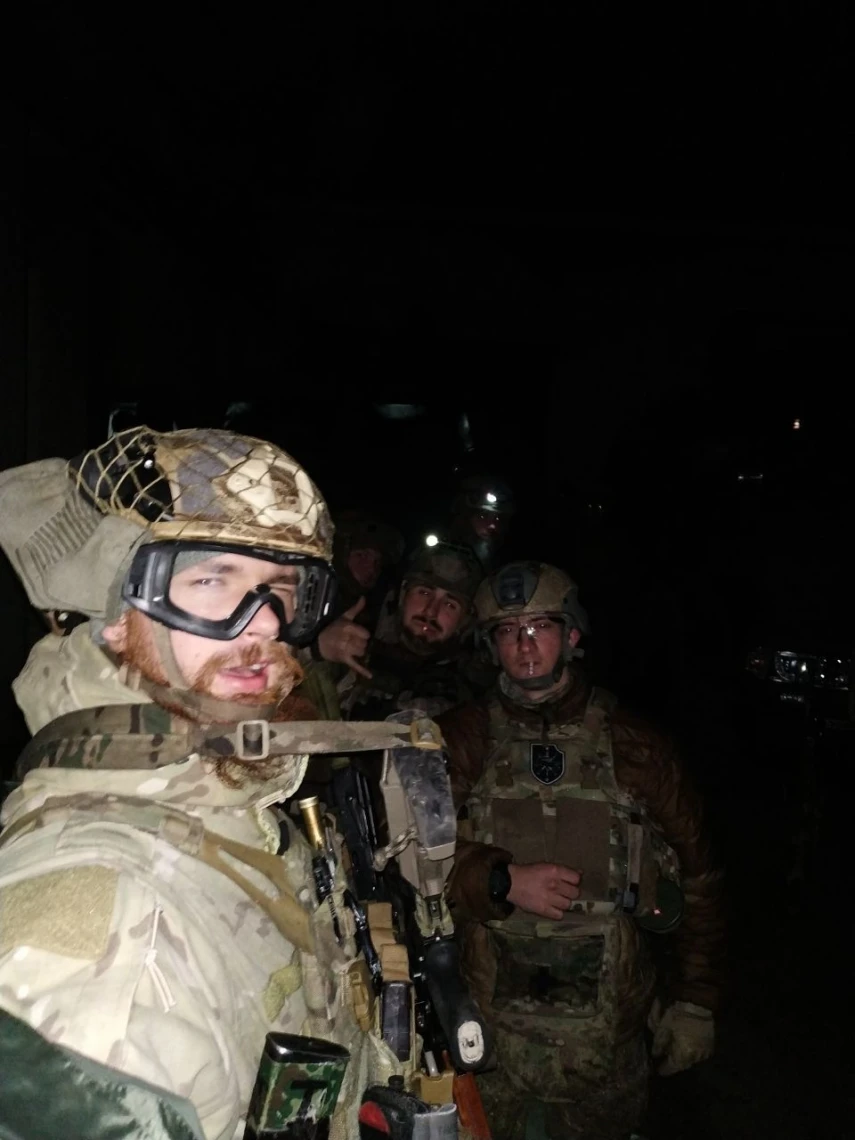
"Real-life horror movie": Mariupol defender Pchela on city battles and captivity
Mariupol veteran Oleksandr, call sign Pchela, has been through every circle of hell since the full-scale invasion began — facing Russian assaults, sustaining injuries, enduring captivity, and now undergoing long-term rehabilitation
Today, he's fighting to save his leg, which became 6 cm shorter due to a delayed operation. But his biggest demand is simple: never forget his brothers still in captivity — mutilated in the Olenivka barracks and yet to be returned to Ukraine.
In an interview with Espreso, Oleksandr shared stories of combat missions behind enemy lines, life at Azovstal, and how the war has evolved.
"Russians are bad, godless, but not stupid"
Before the war, Oleksandr studied psychology and worked in trade. But a quiet life didn’t sit right with him. At 25, he felt it was his duty to serve. In 2020, he volunteered for the Azov Regiment — a choice his father encouraged. It was exactly the kind of military he had envisioned.
"I hesitated a little at first. I joined to prove to myself that I could do it. Of course, my mother didn’t want her son going to war, but eventually, she accepted my choice," Oleksandr recalls.
Even as a teenager, he knew Russia would never give up its grip on Ukraine. War was inevitable — he just hadn’t expected it to be so strategically played.
The start of the war in 2014 caught him off guard.
"Looking back now, with military experience, I see how well-planned it was — intelligence ops, sabotage groups, small-unit tactics, the whole package. Even what Girkin did was top-tier strategy, you could say. Ironically, as Girkin himself admitted, it could’ve all ended at a police checkpoint when they were driving into Sloviansk disguised as a Nova Poshta delivery. They bribed the officer with 500 UAH and drove on. They were ready to kill him if needed, and then the whole war would’ve started not in Sloviansk but in the suburbs, making it much harder to seize the city. And that’s the irony: for 500 UAH, we got a massive war in Donbas. That was a shock to me," Pchela says.
When Russia took Crimea without a fight, he tried to enlist in the National Guard but was put on a waiting list.
"Now I get it, I must’ve been rejected by the psychologists. And I, like an idiot, believed them. It was just a way to ease their conscience."
His second attempt to enlist was successful. When the full-scale invasion hit, he was ready for war.
"In February 2022, our unit was fully prepared and on high alert. Russia had been running massive exercises on the border, and every intelligence agency in the world warned of an attack. Personally, I didn’t think we’d hold out. Everyone was hyping up the ‘second-best army in the world.’ Sure, we had artillery, mortars, and tanks, but they had air power and missiles. At first, it looked like a one-sided fight if they used their full force. But, as we see now, things played out a little differently," he says.
If the Russians had followed military strategy properly, he believes things would’ve been much tougher. But they were banking on a warm welcome from Ukrainians, so they skipped proper tactics.
"Russians are bad, godless, but not stupid. This country has been at war its entire history. They constantly update their combat techniques. But here, they thought they could take an entire country with a quick charge," he says.
"Every battle we fought for Mariupol was epic"
In Mariupol, according to the military, the loss ratio was anywhere from one to six, or even one to ten — Russian casualties were significantly higher. At the start of the battle, as long as there were artillery shells, mortars, and tanks, the Russians couldn’t even get close to the city. And as long as that ratio held, they panicked.
"Twenty thousand troops were sent to Mariupol, and up to 10,000 of them died. Those are major losses. Every battle we fought was epic. I had my first real battle during a raid behind enemy lines. We had four 'armored vehicles' and a mission to storm a residential sector of Mariupol where the Russians had a command post and an ammunition depot. They had tanks and armored personnel carriers stationed there. It was their rear base — a place to rest and regroup.
At six in the morning, we hit them head-on. Our four 'armored vehicles' sped in, packed with troops inside and out. We fired in all directions, at every house, every window, because Russians were everywhere. We drove straight into a full encirclement, and within minutes, we wiped everything out — every soldier there. Then our armored personnel carrier took out a Russian tank.
In the middle of the fight, I opened the door of the APC and came face to face with a Russian tanker. No hesitation, I just fired until he dropped. Later, I found out a dozen other guys were shooting at him at the same time.
A recon unit or snipers took out their observation post. Our guys grabbed 20 grenades each and hurled them at the enemy. It was a full-blown meat grinder. In short, we killed everyone and got out. That was my first and most brutal battle, fighting the enemy at just ten meters. But at that moment, I felt nothing. I was just following the playbook," the soldier recalls.
He says the enemy felt like walking targets. The reality of it all only hit him once they got back in the vehicles and retreated. The shock came later, along with the realization of just how close they had been to death.

Oleksandr (center) with his comrades. Mykyta Belymenko (Topaz) and Ivan Chernenko (Haba).
Belymenko died in battle, Chernenko is still in captivity
Wounded at the best job in the world
After another enemy assault, Oleksandr was seriously wounded in the thigh. He’s certain he should have been left bleeding in that basement until combat medics could reach him. But his comrades risked their lives to get him out, even under fire.
"A bunch of people put themselves in danger to evacuate me. My comrades said, 'No, we’re getting you out.' And they did, despite the risk. They did everything to pull me from that zone. Even when I told them, 'Guys, this is it, I’m going to die here,' they didn’t give up. In moments like that, people hold onto hope and faith. That’s why this is the best job in the world. Civilian life isn’t like that. There, it’s survival of the fittest."
After the injury, Pchela was completely bedridden. The bullet shattered his femur into small fragments. He couldn’t move, the sharp ends of the bones cut into his nerves, and the pain paralyzed him. Food and medicine were running out. To quench his thirst, he drank water from the radiators.
"After the evacuation to Azovstal, I lay in a bunker with the wounded, flat on my back like a doll. I was in such bad shape I couldn’t even use a bedpan. At first, things were manageable, the kitchen still worked, but after a few direct hits, real dark times began. People were starving, out of cigarettes, out of medicine. No clean water. No healthy people left to help the wounded. We drank whatever we could, water drained from the radiators, when we were lucky enough to get even that.
When everything’s fine, it’s easy to call yourself a hero, say you’ll hold out to the end. But when starvation sets in, people lose their humanity, you know?" says Oleksandr.
He says extreme conditions can break people — some lose their moral compass.
"God must have helped me survive that hell because he left people around me who still cared. One comrade, seeing me dying of dehydration, went to boil radiator water so I could drink at least a little. He begged around for antiseptic. They gave me a glass of water, that’s what kept me alive. Nina, the anesthesiologist — she probably saved my life. Some nurses rushed over and set up a drip for me. They bandaged me once a week, there weren’t enough supplies for more. They had to triage: if it could wait, it waited. My leg wasn’t rotting yet, so once a week was all I got. When I was taken prisoner in May and sent to a hospital in Donetsk, my leg started to rot. If I’d stayed in Azovstal just one more week, I would have lost it," he says.
He considers himself lucky in captivity, at least he ended up in a hospital staffed by the mobilized. His comrades in the Olenivka colony weren’t so lucky, they fell into the hands of Russian internal troops, who hate Ukrainians with a passion. Due to the severity of his wound, Oleksandr was marked as "red" (critical condition) and was exchanged in late June 2022.
"They didn’t give me proper care, no surgery, so my leg healed wrong. It ended up six centimeters shorter, and I’m still undergoing treatment. I couldn’t return to combat. Then I was diagnosed with cancer. Once I started recovering, I switched to training new recruits, passing on my experience. And now, I’m in the process of lengthening my leg with an external fixation device," says Oleksandr.
"Our prisoners of war must be remembered every day, every minute."
The soldier urges the world not to forget those still held captive, as well as the victims of Olenivka. This has become his priority because he knows firsthand what it means to be wounded in captivity.
"They’re not just sitting there, they’re seriously wounded, like I was. Some are in even worse condition, enduring brutal torture. If three months without surgery cost me three years of treatment, what happens to those who’ve been held for three years? They’ll be released only to spend the rest of their lives recovering. It’s an enormous burden on their families. I saw what happened to my mother after my captivity — she looked like she was on the verge of life and death," Oleksandr recalls.
When the Azovstal fighters surrendered, Pchela continues, they believed in their country, in their government, in guarantees. They shouldn't have to go through this nightmare.
"In captivity, our people are dying in agony. We have no right to look away. This must be talked about every day. Every minute. Billboards, articles, TV reports — everywhere. Every time someone opens Instagram, they should see news about the prisoners. We also can’t forget Bucha, Irpin, Mariupol. But people are more interested in what Trump said or what drugs Musk takes. Our real victory is the survival of the Ukrainian nation. We win when we rebuild, when we have children, when they grow up knowing one thing: our greatest values are our faith and our nation."

Oleksandr with his comrades: Oleksiy Kovalenko (Broker), Oleksandr Dubrovkin (Zumer), Stanislav Kovshar (Bard, the author of the selfie). Zumer died, the bodies of Broker and Bard were not found
Russian tactics haven’t changed since World War II
Oleksandr says that no matter how powerful the Russia is, they're not invincible.
"Russia’s military machine has its limits. Their losses are massive. Back in World War II, the Germans developed tactical manuals for fighting each country. The Americans seized these manuals, compiling a collection of enemy strategies, including those of the USSR. Using this, they predicted how the Soviet Union would attack NATO in a future World War III. The plan involved three waves," the soldier explains.
The first wave was Allied forces, taking the initial hit. Then came mobilized Ukrainians or Belarusians, wearing down enemy defenses and clearing the way for the main army. The third wave? Elite, well-equipped Russian troops moving in on weakened positions.
"Russia still uses this approach. If the first large-scale assault fails, they send in mobilized troops — cannon fodder — trained just enough under combat veterans. The tactics are the same: conscripts attack first, exhaust the defense, then professional soldiers and special forces move in. When they run out of soldiers, they raise financial incentives to lure new recruits. You can see the pattern: the more losses, the higher the payouts. Now, as their soldier reserves shrink, they’ve started using North Korean troops. Just more cannon fodder. Russia is ruthless, and so are its tactics. They know they can’t win without professionals," says Pchela.
The soldier adds that the enemy has lost a huge amount of equipment.
"That’s why they’re increasingly launching attacks on motorcycles, ATVs, old cars, whatever they can find. They simply don’t have enough reliable transport to move troops to Ukrainian positions," Oleksandr notes.
Still, he emphasizes that Ukraine paid a heavy price in 2022, losing some of its most motivated and capable people — the true backbone of the nation. Many died, others were captured, and countless were seriously wounded.
"If you turn your back on the monster, it won’t disappear"
The soldier is certain: anyone even thinking of surrender should remember the devastation Russia has caused.
"I always remind myself: Bucha, Irpin, Mariupol, Kherson. If someone is ready to forgive those responsible — knowing that children were raped, wives were butchered — then these memories snap me back to reality.
This isn’t just a tragedy; it’s a lesson. A warning to the entire world about what happens when people do nothing, when they turn away from danger. It’s like a horror movie trick, when the monster is right next to someone, and they refuse to look out of fear. The instinct is simple: if you don’t see it, it doesn’t exist. A monster people ignore because they’re too afraid to acknowledge it.
If I forgive these people, if I don’t learn from this, if I don’t do everything I can to stop it from happening again, I won’t be able to live with myself. Because this isn’t a movie. This is real. And it’s not just a tragedy, it’s pure horror. A horror movie playing out in reality. And not in some distant land, not in Africa or on the other side of the world. Right here. Near Kyiv. In the heart of Europe. And that is a slap in the face to the entire civilized world," Oleksandr concludes.
- News












































